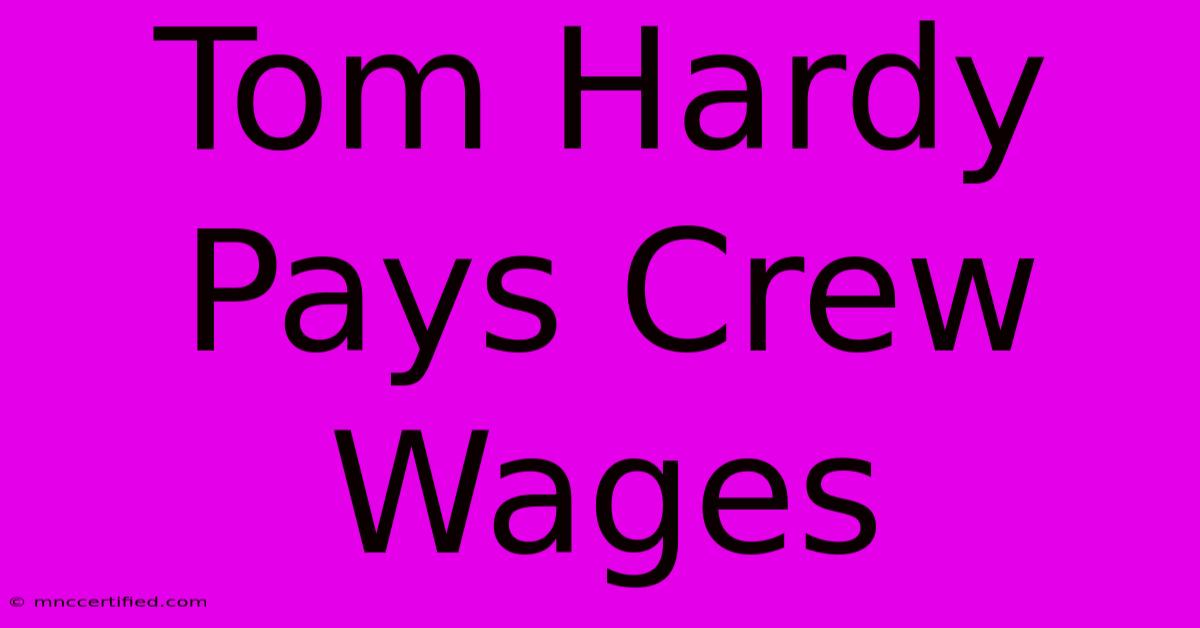Tom Hardy Pays Crew Wages

Table of Contents
Tom Hardy Pays Crew Wages: A Gesture of Respect and Responsibility in Hollywood
Tom Hardy, the acclaimed British actor known for his intense roles and dedication to his craft, recently made headlines for a heartwarming gesture: paying the wages of crew members on his latest project. This act of generosity highlights a crucial issue within the film industry and showcases Hardy's commitment to fair treatment and worker well-being. This article delves into the details of this event, its implications, and the broader context of fair wages in Hollywood.
The Significance of Hardy's Action
Hardy's decision wasn't simply a publicity stunt; it was a direct response to concerns about production delays and potential financial hardship for the crew. By covering the crew's wages, he ensured that hardworking individuals wouldn't suffer due to unforeseen circumstances impacting the project's schedule. This underscores a significant responsibility often overlooked in the glamorous world of filmmaking: the well-being of the hundreds of individuals who contribute behind the scenes.
This act speaks volumes about Hardy's character and his understanding of the industry's complexities. Unlike many high-profile actors, he recognized the vulnerability of the crew and took proactive steps to mitigate the risk of financial insecurity. This contrasts sharply with instances where productions face delays and crew members find themselves without pay for extended periods, facing considerable financial strain.
Beyond the Headlines: A Deeper Look at Fair Wages in Hollywood
Hardy's gesture shines a spotlight on the broader issue of fair wages and worker rights in the film industry. While the actors and directors often garner significant compensation, many crew members—including camera operators, grips, electricians, and countless others—rely on consistent paychecks to support themselves and their families. Production delays, budget cuts, or unforeseen circumstances can severely disrupt their income, causing significant hardship.
The film industry, while often perceived as glamorous, is structured in a way that can leave many workers vulnerable. The prevalence of short-term contracts, coupled with the unpredictable nature of film production, contributes to a system where job security and financial stability are not guaranteed. Hardy's action serves as a powerful reminder of the importance of addressing these systemic inequalities.
The Impact of Hardy's Actions on the Industry
Hardy's act of generosity has garnered widespread praise, prompting conversations about the need for greater protections and ethical considerations within the industry. It serves as an example that other prominent figures in Hollywood could follow, encouraging a more responsible and equitable approach to managing film productions and supporting the workforce. His actions could even inspire a wider movement towards greater transparency and worker protection, potentially influencing future production contracts and industry standards.
The Importance of Fair Labor Practices in Film Production
The future of the film industry depends on ensuring that all its workers—from the biggest stars to the essential crew members—are treated fairly and with respect. Hardy's decision emphasizes the significance of fair labor practices and the importance of prioritizing the well-being of everyone involved in filmmaking. It encourages a conversation about building more sustainable and ethical production processes that safeguard the rights and livelihoods of all workers.
Conclusion: A Model for Ethical Conduct in Hollywood
Tom Hardy's decision to pay the wages of the crew on his project stands as a testament to his integrity and social responsibility. It highlights the critical need for greater emphasis on fair wages, job security, and worker well-being within the entertainment industry. His actions serve as a model for ethical conduct and inspire hope for a more equitable and sustainable future for those working behind the scenes in Hollywood. Hopefully, his gesture will inspire similar acts of generosity and accountability from other high-profile figures, ultimately improving working conditions across the film industry.

Thank you for visiting our website wich cover about Tom Hardy Pays Crew Wages. We hope the information provided has been useful to you. Feel free to contact us if you have any questions or need further assistance. See you next time and dont miss to bookmark.
Featured Posts
-
Pubs Facing Guinness Supply Crunch
Dec 18, 2024
-
Confirmed Chelsea Women Face Real Madrid Ucl
Dec 18, 2024
-
No Payment For Waspi Women
Dec 18, 2024
-
Update Abundant Life School Shooting Motive
Dec 18, 2024
-
Vanuatu 7 3 Earthquake Death Toll Rises
Dec 18, 2024